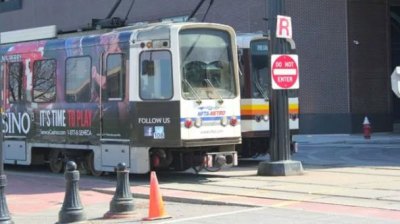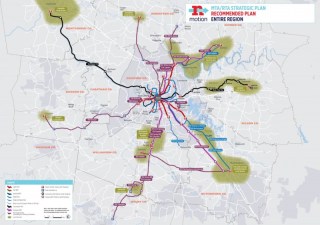Gas Tax Hike Will Help New Jersey Pay for New Rail Tunnel
To history’s list of epic negotiations, we may someday add the prospective deal to finance the Gateway Project between Newark’s and New York City’s Penn Stations. With two belligerent states, a disgraced Port Authority, and Amtrak and the federal government on the hook for Gateway’s $15 billion (and counting) expense, divvying up the cost will be contentious, to say the least. But the final equation will almost certainly include a rise in New Jersey’s stunningly low gasoline tax.
The recent history of cross-Hudson rail tunnels is tortuous and depressing, with few rewards for paying close attention. Informed observers agree, however, that New Jersey Governor Chris Christie’s main motive in cancelling the ARC rail tunnel in 2010 was mercenary: the state’s Transportation Trust Fund had run dry, and big bills for highway expansion were coming due. Scrapping ARC allowed Christie to divert $2.5 billion in Port Authority tunnel funds to road projects. Thumbing his nose at New York State and proving his anti-transit bona fides to fellow Republicans were bonuses.
Five years on, the ARC cancellation is blowing up in Christie’s face. No less a bigwig than New York Senator Chuck Schumer this week labeled it “one of the worst moves made by any political figure in the New York area for over 100 years.” The reason, of course, is the prospective “transportation Armageddon” (Schumer again) from losing 75 percent of cross-harbor passenger-rail capacity if just one of the two ancient Sandy-damaged rail tunnels ceases to function — as happened on multiple days last month, causing some rail commuters’ 15-mile trips to stretch out to three hours.
Schumer, of course, is a Democratic Party stalwart — he’s set to succeed Minority Leader Harry Reid as the Senate’s ranking Democrat next January. But in his third term he has attained avuncular status that transcends partisan divisions, at least in nuts-and-bolts issues like infrastructure. That helps explain why his proposal this week to create a new non-profit corporation to assemble the billions needed to build a new cross-harbor tunnel and oversee the project has attracted mostly glowing coverage. (It doesn’t hurt that Schumer’s statesmanship contrasts markedly with other politicians’ finger-pointing and buck-passing.)
Both personally and politically, Christie may be no more disposed to have New Jersey cough up funds for the Gateway project than he was five years ago for ARC. But he has far less room to maneuver. Of late, Christie has been ridiculed for GWB-gate, slammed for using the Port Authority as a political piggybank, and practically disavowed by his Republican Party. Now, the need for a new Hudson rail crossing, if only for redundancy so the existing tunnels can be rehabbed, has graduated from hypothetical to dire. With a reported 80 percent of rail tunnel passengers residing, and voting, in New Jersey, it’s unlikely that Christie will be able to blow off Gateway the way he blew off ARC.
Wherever New Jersey’s share of Gateway costs settles out, the logical funding source is exactly what it was for the ARC tunnel: raising the state’s gasoline tax. Here too, the objective factors have only grown more compelling. Not only is the price of gas in a deep trough and likely to remain there to cushion a tax rise. But New Jersey’s state tax rate on gasoline (and diesel) is more of an outlier than ever. At just 10.5 cents a gallon, New Jersey’s gas tax is the third lowest among the 50 states and Washington, DC, and less than half the national average of 21.9 cents, as the graphic shows. (The discrepancy is now even greater, as half a dozen states have taken advantage of the drop in pump prices to raise their gas tax since 2013.)
Taxable sales of gasoline and diesel fuel in New Jersey are between 4.5 and 5 billion gallons a year. [The original version of this post mistakenly put the range 10 times too low, at 450-500 million gallons.] Lifting the state tax rate to the U.S. average would generate over half-a-billion dollars a year in new revenue, free and clear. A slightly smaller but rounder dime a gallon hike would bring in nearly that much. Either way, that’s five billion dollars of found money in the decade it should take to build Gateway. (I haven’t factored in price-elasticity or price-shopping, but the modest increase and the fact that taxes in neighboring Pennsylvania and New York would remain considerably higher render those points nearly moot.)
It is true that making all Jersey drivers pay a little more for gas so that residents of north Jersey can reach Manhattan by train (and by car as well, since the viability of highway travel depends critically on non-highway alternatives) won’t be popular with some voters in the rest of the state. Legislative leaders might look to New York as a model. Here, residents in the 12-county MTA region pay higher sales taxes as well as payroll and other taxes to support mass transit. An analogous arrangement in New Jersey, with a larger gas tax hike in the state’s northern counties and lesser increases elsewhere, could be part of a statewide formula to pay the state’s eventual share of Gateway.


